

Which Character Strengths Are Most Predictive of Well-Being? In 2004, Christopher Peterson and Martin Seligman came out with Character Strengths and Virtues: A Handbook and Classification.
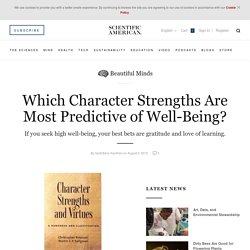
This volume was a significant contribution to psychology, a sort of antidote to the DSM's focus on mental illness, and an important reminder to psychologists that humans aren't only full of illness. Humans also have a lot of character. The book laid out the following 24 character strengths: In his book Flourish, Martin Seligman, the founder of the field of positive psychology (and my boss), argued that the five fundamental elements of well-being are: The main tenet of the field of positive psychology is that the path to well-being lies in nurturing your highest strengths. Just One Thing: Hold Wants Lightly. Getting caught up in wanting—wanting both to get what’s pleasant and to avoid what’s unpleasant—is a major source of suffering and harm for oneself and others.
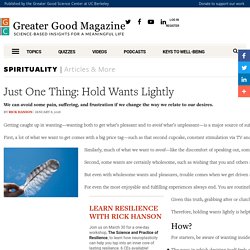
First, a lot of what we want to get comes with a big price tag—such as that second cupcake, constant stimulation via TV and websites, lashing out in anger, intoxication, overworking, or manipulating others to get approval or love. On a larger scale, the consumer-based lifestyle widespread in Western nations leads them to eat up—often literally—a huge portion of the world’s resources.
GratitudeLog - The Happiest Place on the Internet! Dr. Martin Seligman - The Three Blessings Exercise. I posted this video about a year ago, and many of my current Followers have never seen it.
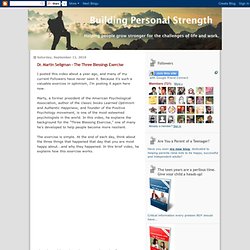
Because it's such a valuable exercise in optimism, I'm posting it again here now. Marty, a former president of the American Psychological Association, author of the classic books Learned Optimism and Authentic Happiness, and founder of the Positive Psychology movement, is one of the most esteemed psychologists in the world. In this video, he explains the background for the "Three Blessing Exercise," one of many he's developed to help people become more resilient. The exercise is simple. A Simple Exercise to Increase Well-Being and Lower Depression from Martin Seligman, Founding Father of Positive Psychology.
By Maria Popova You’ll need pen, paper, and a silencer for cynicism.
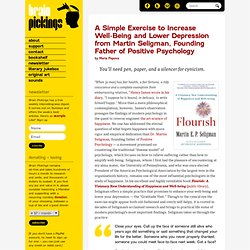
“When [a man] has fair health, a fair fortune, a tidy conscience and a complete exemption from embarrassing relatives,” Henry James wrote in his diary, “I suppose he is bound, in delicacy, to write himself happy.” More than a mere philosophical contemplation, however, James’s observation presages the findings of modern psychology in the quest to reverse-engineer the art-science of happiness. No one has addressed the eternal question of what begets happiness with more rigor and empirical dedication than Dr. 6 Habits of Highly Grateful People by Jeremy Adam Smith. Wearing yourself down with worry?

It’s time to thank outside the box. posted Dec 23, 2013 This article originally appeared on Greater Good, the online magazine of UC Berkeley's Greater Good Science Center. I’m terrible at gratitude. How bad am I? How Gratitude Can Help You Through Hard Times. A decade’s worth of research on gratitude has shown me that when life is going well, gratitude allows us to celebrate and magnify the goodness.
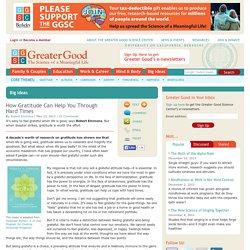
But what about when life goes badly? In the midst of the economic maelstrom that has gripped our country, I have often been asked if people can—or even should—feel grateful under such dire circumstances. My response is that not only will a grateful attitude help—it is essential. In fact, it is precisely under crisis conditions when we have the most to gain by a grateful perspective on life. In the face of demoralization, gratitude has the power to energize. Don’t get me wrong. But it is vital to make a distinction between feeling grateful and being grateful. TEDxSF - Louie Schwartzberg - Gratitude. The Cure for Impatience: Gratitude. You’ve probably heard of the classic cookie experiment on children and willpower.
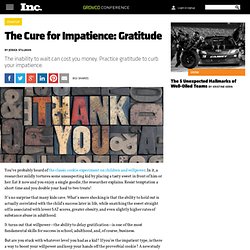
In it, a researcher mildly tortures some unsuspecting kid by placing a tasty sweet in front of him or her. Eat it now and you enjoy a single goodie, the researcher explains. Resist temptation a short time and you double your haul to two treats! It’s no surprise that many kids cave. What’s more shocking is that the ability to hold out is actually correlated with the child’s success later in life, while snatching the sweet straight off is associated with lower SAT scores, greater obesity, and even slightly higher rates of substance abuse in adulthood. How to Be Thankful by Changing One Word. My college strength and conditioning coach, Mark Watts, taught me an important lesson that applies to life outside of the gym… As adults, we spend a lot of time talking about all of the things that we have to do.
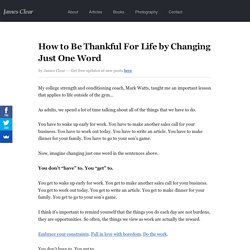
You have to wake up early for work. You have to make another sales call for your business. You have to work out today. You have to write an article. Now, imagine changing just one word in the sentences above. The Power of Awe: A Sense of Wonder Promotes Loving-Kindness. The Mind-Bending Science of Awe. The natural world can provoke awe on a large scale.

(Photo: Lane Pearman/flickr) Awe is not an everyday emotion. You don't wake up awestruck. A satisfying lunch doesn't leave you filled with awe.